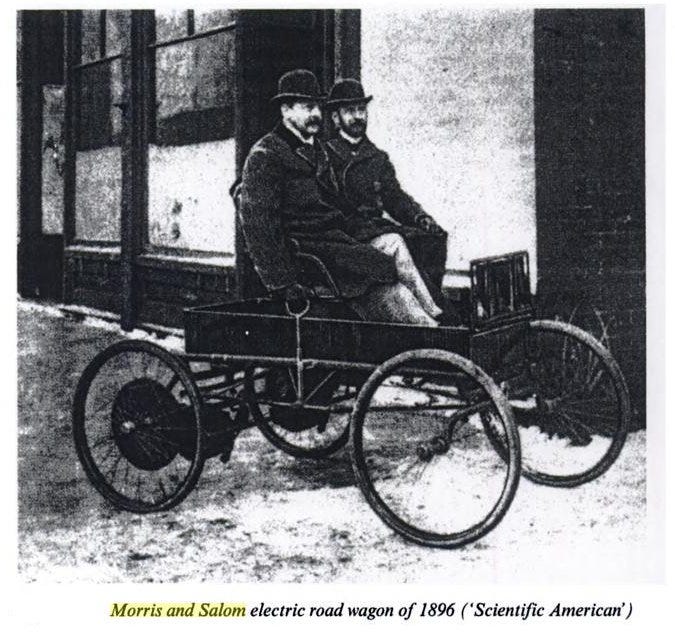Climate Solutions // I S S U E # 7 8 // V O T E
Welcome to Hothouse. Hothouse is original climate journalism with a way to act. As a climate solutions newsletter, we dig into the evidence, figure out what works, and deliver the news to your inbox.
This issue is a special dispatch on going beyond the ballot box for the climate. Subscribe here.
Beyond the ballot box
Election season is here again. So, last night, I voted. The mail-in ballot for San Francisco ran to eight pages, in small type. It was a lot of choices, only one of which—a measure on electric vehicles—explicitly dealt with climate change.
But, in truth, most of the bubbles I filled in were votes for the climate. From senators to secretaries of state to judges to utility commissioners, each race mattered. The reason is path dependency, the idea that institutions and technologies are profoundly affected by their early beliefs, values, and structures. As the past arcs to the future, systems’ early characteristics are amplified.
Take electric vehicles. The first commercial EV drove down the streets of Philadelphia in…1894. The market at the time was evenly divided between vehicles powered by electricity, gasoline, and horses. EVs, in many ways, were far superior. They didn’t require stables. They outperformed their noisy, expensive, and unreliable gas-powered cousins. But politics, engineering, and geology (the Texas oil patch) intervened. EVs were largely abandoned by major automakers for a century. Since then, trillions of dollars have gone into refining gasoline engines and building infrastructure for them, reinforcing their dominance. Switching back to EVs is that much harder.
So it is with emissions. A small reduction now is often more valuable than big cuts decades in the future. Every small act, or climate-conscious public utilities commissioner, can bend the trajectory of our emissions. These decisions—installing a pipeline, permitting a solar farm—are magnified by the magic of compounding math, buying us time.
So just as every summer is likely to be the coolest one of the rest of my life, every election now promises to be among the most important of my life, and yours, especially for the climate.
Peak Congressional action
The US Congress just passed the largest climate bill in history: the Inflation Reduction Act. In truth, it’s a massive $374 billion climate spending bill expected to cut emissions by around 40% by 2030. Its passage was something of a miraculous confluence of events: a unified Democratic Senate, Joe Biden in the White House, and a nail-biting reversal by West Virginia Sen. Joe Manchin.
Ambitious climate action in Congress is now likely to stall for some time. Democrats will likely lose control of the federal government in the mid-terms. The House, if not the Senate, is expected to come under Republican control. That means momentum for climate action will swing back to state and local governments—many of which are now responsible for the decisions on how to spend that $374 billion.
For the foreseeable future, politicians and policies that rarely break the surface of public consciousness will hold enormous sway over our climate future. And that’s ok. The Inflation Reduction Act puts the US within reach of 80% clean electricity by 2030—and perhaps net-zero emissions by mid-century. To borrow a baseball analogy, Congress just hit a triple at the bottom of the ninth. Bringing the runner home is now much easier.
With that in mind, it’s time to start thinking down the ballot and beyond voting every two (or four) years. No matter where you sit on the political spectrum, I’ve compiled a list of the most effective organizations pushing for climate candidates and policies on Nov. 8—and beyond.
Vote, volunteer, and donate.
What’s the easiest way to give to crucial swing states?
Imagine a wonky policy analyst who has spent the last six months in her basement analyzing political candidates, scouring their speeches for climate sentiment, and weighing the odds of races determining where your dollar will go furthest.
That’s GiveGreen.
It’s run by the League of Conservation Voters, a non-partisan, legacy organization that has a long history of “defending [environmental] champions and electing new ones” regardless of party affiliation. Conveniently, they’ve done this for virtually all the races you might be voting in: federal, state, and down-ballot. All you have to do is press donate. It will evenly divvy up your donations among candidates running in the handful of most critical tossup races. Donate (and bookmark them) for the future:
Give here to divide your contribution among top toss-up Senate races.
Give here to divide your contribution in three toss-up House races.
There are so many races. I want to support the overlooked candidates.
Then you should give to the “Climate Slate.” The is a set of local and state candidates assembled by Climate Cabinet, a startup building the most comprehensive and in-depth database of local voting patterns and politicos. After analyzing more than 1,000 political races, they’ve picked the down-ballot races with the greatest climate impact per campaign dollar, and will distribute donations evenly among them. Emma Fischer of Climate Cabinet says their insights come from tracking 32 million climate voting records and political variables that identify the folks most likely to support or oppose climate progress. “This allows us to find and support high-impact climate candidates across the country,” says Fischer. “Think of us like Moneyball for Climate.” For this election, you can give to their slate of candidates, as well as their own Climate Cabinet PAC, a political action fund aiming to have a high “climate ROI” by supporting low-budget races with big climate impact.
Give to ClimateCabinet directly or use this slate to support climate candidates in ‘down-ballot races’ and Climate Cabinet PAC.
So I’m a climate conservative (or know one). What have you got?
Plenty. The American Conservation Coalition, a new arrival on the scene founded by Benji Backer, is an environmental non-profit taking action through “common-sense, market-based, and limited-government ideals.” Similar efforts have fizzled in the past, but the ACC has corralled an impressive 74 House Republicans into joining what they call the Conservative Climate Caucus. The group has defied the climate change-denying wing of the Republican party, stating flatly that “the climate is changing,” and is committing to work to reduce emissions (albeit not by renouncing fossil fuels). They don’t have a long track record, but there are some promising early signs.
For those who lean right—and as Thanksgiving approaches, for your nearest and dearest—the ACC is for you (and them). You can give the gift of membership (free) to find like-minded folks, and support the growing share of younger Republicans ready to act on climate. When I asked a scientist about the most credible conservative groups on climate, they pointed to the ACC. “If you’re looking for THE conservative climate organization,” they said, “it’s Benji’s ACC.”
This is great, but cash is tight. How can I give an hour instead? Or several?
The hour of action is for you. Ever wish you could just show up and someone could tell you exactly how to spend your hour most effectively? Meet Climate Changemakers. They’ve done all the work. Just pick your next hour here.
Make a phone call: Phone banking with the Environmental Voter Project is easy, effective, and targets self-identified environmentalists in key districts who might not otherwise vote this mid-term without your call.
Write a letter: Letter-writing campaigns can boost turnout by as much as 4.2 percentage points, check out Vote Forward (and here’s a playbook to get started).
Got a day? Knock on doors! Find an accessible canvassing effort to plug into here.
Go get ‘em. 🏃🏽♀️
Hothouse is a weekly climate action newsletter written and edited by Mike Coren and Cadence Bambenek. We rely on readers to support us, and everything we publish is free to read. Follow us on Twitter or LinkedIn.











Absolutely love this issue! It's awesome to see how many cool organisations there are over there in the US dedicated to making it easier to vote climate. Really inspiring :) Also love the high-impact actions at the end if people would prefer to volunteer their time.